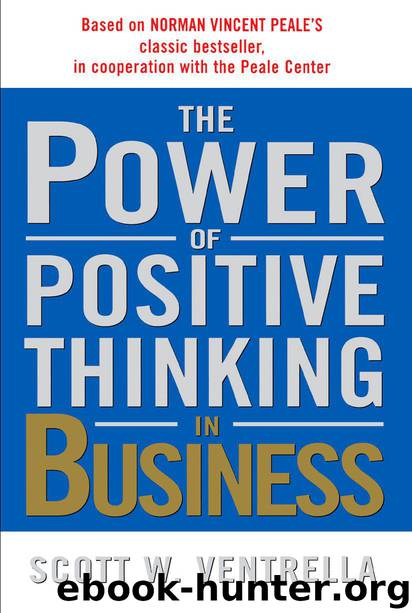The Power of Positive Thinking in Business: Ten Traits for Maximum Results by Scott W. Ventrella

Author:Scott W. Ventrella [Ventrella, Scott W.]
Language: eng
Format: mobi
Publisher: Free Press
Published: 2001-06-23T14:00:00+00:00
8
Uplifting Power
Uplifting Power is the power to energize ourselves in mind, body, and spirit as we move on to great things. It is a form of self-motivation for when we have to do something we don’t particularly want to or the road gets bumpy and uncertain. Sometimes we need Uplifting Power to get us moving; other times we need to tap into it along the journey, when we feel as if we are stuck in a rut.
UPLIFTING POWER: OPTIMISM
Optimism is a belief in and expectation of positive outcomes, even in the face of difficulty, challenge, or crisis.
Optimism is often confused with positive thinking. People use the terms interchangeably, but, as we learned in Chapter 2, they’re not the same; all positive thinkers are optimistic, but not all optimists are positive thinkers! The word “optimism” derives from the Latin word optimus, meaning “best.”
We demonstrate optimism each time we .. .
• See the benefits of and positive opportunities in a crisis, problem, or difficulty.
• Assume or expect success, satisfaction, or achievement in an endeavor.
• Identify the limitless possibilities we have to shape the life we desire.
• Meet a challenge or address a new opportunity with a feeling of control.
• Eliminate or diminish the impact of fears, doubts, and concerns, whether internal or external.
• Keep our spirit up despite difficult circumstances.
• Tackle problems with a mind-set of “how,” not “if,” they can be solved.
Maintaining a hopeful, expectant attitude during challenging times is critical in the work environment. It can make all the difference between successful outcomes and unsuccessful ones. Pessimism, meanwhile, is a pervasive expectation of negative outcomes.
Pessimism nevertheless has some redeeming points. I remember having a discussion with a business acquaintance who commented, “I’m not a pessimist, just a realist.” The fact is that pessimism can be reality-based. And there’s nothing wrong with being grounded in reality. According to Dr. Martin Seligman, professor of psychology at the University of Pennsylvania, depressed people, many of whom are also pessimists, accurately judge how much control they have over various situations. Optimists, on the other hand, believe they have much more control over situations than they really do—even when they are helpless and have no control at all! The pessimist sees the stark reality of situations, which to some degree can be useful in the business setting.
Think of those who have financial responsibility in an organization. These people deal with facts and figures every day. The good news is that we can count on them to be the voices of reason when making major financially based decisions. There is such a thing as healthy pessimism in business—it causes us to proceed with caution and encourages us to be more careful, thoughtful, wise, and analytical. But too often, pessimism gets in the way of creative brainstorming, idea generation, and problem solving. The pessimists justify their role by suggesting that they are looking after the good of the organization. Although that’s true to an extent, I have found that pessimists in business are often pervasively pessimistic, meaning that the pessimism extends to all aspects of their jobs.
Download
This site does not store any files on its server. We only index and link to content provided by other sites. Please contact the content providers to delete copyright contents if any and email us, we'll remove relevant links or contents immediately.
The Brazilian Economy since the Great Financial Crisis of 20072008 by Philip Arestis Carolina Troncoso Baltar & Daniela Magalhães Prates(133812)
International Integration of the Brazilian Economy by Elias C. Grivoyannis(109759)
The Art of Coaching by Elena Aguilar(53187)
Flexible Working by Dale Gemma;(23285)
How to Stop Living Paycheck to Paycheck by Avery Breyer(19719)
The Acquirer's Multiple: How the Billionaire Contrarians of Deep Value Beat the Market by Tobias Carlisle(12310)
Thinking, Fast and Slow by Kahneman Daniel(12253)
The Radium Girls by Kate Moore(12017)
The Art of Thinking Clearly by Rolf Dobelli(10451)
Hit Refresh by Satya Nadella(9125)
The Compound Effect by Darren Hardy(8942)
Tools of Titans by Timothy Ferriss(8363)
Atomic Habits: Tiny Changes, Remarkable Results by James Clear(8323)
Turbulence by E. J. Noyes(8040)
A Court of Wings and Ruin by Sarah J. Maas(7811)
Change Your Questions, Change Your Life by Marilee Adams(7758)
Nudge - Improving Decisions about Health, Wealth, and Happiness by Thaler Sunstein(7690)
How to Be a Bawse: A Guide to Conquering Life by Lilly Singh(7471)
Win Bigly by Scott Adams(7183)
